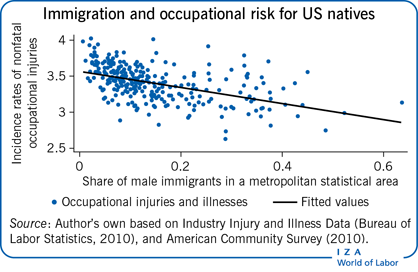Elevator pitch
Public debate on immigration focuses on its effects on wages and employment, yet the discussion typically fails to consider the effects of immigration on working conditions that affect workers’ health. There is growing evidence that immigrants are more likely than natives to work in risky jobs. Recent studies show that as immigration rises, native workers are able to work in less demanding jobs. Such market adjustments lead to a reduction in native occupational risk and thus an improvement in native health.

Key findings
Pros
Immigration can allow natives to work in jobs that involve better schedules, lower rates of injury and fatality, and which are less physically intensive.
There is evidence of positive effects on native workers’ health and subjective well-being after immigrants fill lower-skill jobs.
Improvements in working conditions and health related to increased shares of immigrant workers are concentrated among the most vulnerable native individuals, i.e. low-skilled, blue-collar workers.
Evidence suggests immigrants are still likely to work in safer conditions than in their countries of origin.
Cons
The self-selection of immigrants into riskier jobs contributes to deterioration in their own health.
Immigration increases safety-related costs due to language barriers and different standards of job safety between home and host country.
If immigrants perceive their jobs more positively than natives, they may take excessive risks.
There is some evidence of short-term negative effects on native low-skilled wages and employment in relation to increased shares of immigrant workers.